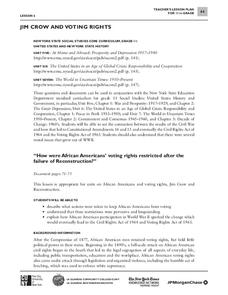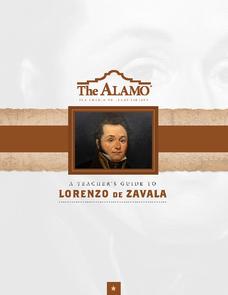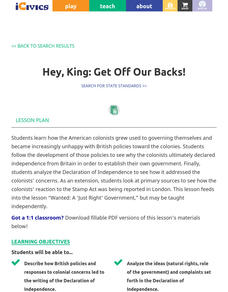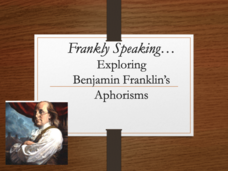School Improvement in Maryland
Court Proceedings Civil Cases
What's the difference between civil and criminal law? How do the court proceedings differ in these two types of trials? How do the standards of proof differ? Why do these differences exist? As part of their examination of the US court...
National Endowment for the Humanities
The "To Do List" of the Continental Congress
What is on your to-do list today? The second lesson of a three-part series on Lost Heroes of America investigates the laundry list of items in front of the second Continental Congress. Scholars research, analyze, and present information...
City University of New York
Jim Crow and Voting Rights
Class groups examine primary source documents to determine how the voting rights of African Americans were restricted after the failure of Reconstruction, and how African American participation in World War II lead to change.
The Alamo
A Teacher’s Guide to Lorenzo De Zavala
Who was Lorenzo de Zavala to the Texas Revolution, and how did he change the Alamo? Find out using an educational resource that asks learners to fill out graphic organizers and respond to short-answer questions to further solidify their...
School Improvement in Maryland
Political Systems: Advantages and Disadvantages
Every political system has advantages and disadvantages. To gain an understanding of these differences, groups investigate the political system of another country—oligarchy, monarchy, dictatorship, parliamentary—and prepare a...
iCivics
Hey, King: Get Off Our Backs!
Young historians explore the reason American colonists were unhappy under British rule. Class members complete hands-on activities and participate in a group discussions to understand why colonists drafted the Declaration of Independence.
Museum of Tolerance
The Role of Citizens in a Participatory Democracy
Groups research participatory democracies and compare the role and rights of citizens in ancient history with those in recent U.S. history. Guided by a series of questions, individuals compose a persuasive essay in which they discuss the...
National Endowment for the Humanities
The House Un-American Activities Committee
Was the House Un-American Activities Committee justified in investigating subversive influences in the entertainment industry? Part two of the three-part series of lessons that examine the anti-communism movement after World War II,...
Curated OER
Land and Liberty: The Saga of Sam McCulloch
The struggles of Sam McCulloch, a free black man, to be recognized as a citizen entitled to own land in Texas are the focus of research project that ask groups to examine a series of primary source documents and piece together...
Foreign Policy Association
U.S. and Europe Online Lesson Plan
Class groups investigate the economic and political implications of a country's policies on genetically modified foods, craft a position paper detailing that policy, and share their findings with the class. Armed with this information,...
Federal Reserve Bank
GDP: Does It Measure Up?
Here is resource that offers a very clear explanation for how economists measure economic growth by comparing real GDP over time. There is also an additional worksheet that details the expenditure method and four components for...
City University of New York
Presidential Elections and the Electoral College
To understand the controversy surrounding the US 2000 presidential election, class members investigate the rationale behind the Electoral Collage, the intimidation involved in the election of 1876, and the 2004 American League...
Curated OER
Lesson 4: The Judiciary: A Brief Introduction to the Courts System
Focusing on the judicial branch of government, the fourth lesson in this series explores the structure of the US courts system. Beginning with an engaging activity based on the short story The Lady or the Tiger, students go on to examine...
Civil Rights Movement Veterans
Timeline of Events: 1960’s Civil Rights Movement of St. Augustine, Florida
A timeline can be a powerful learning tool because it reveals a pattern in events. While few would consider St. Augustine, Florida a hotbed of the 1960s Civil Rights Movement, a selection of background information and a timeline of...
Music Publishers Association of the United States
I Made It. I Own It. Please Don't Steal It.
Explore the world of copyright law with a variety of activities to instill the importance of respecting creative property. Scholars watch an animated tale then take part in a grand conversation detailing the video's main idea, details,...
Constitutional Rights Foundation
The Election of 1912
The Election of 1912: an election with four competitive opponents. Pupils get to know the candidates with informative reading passages that provide context to the election. Then, the class engages in a debate and answers questions as one...
Constitutional Rights Foundation
Conservation, Preservation, and the National Parks
Going green? Scholars investigate the creation of the US National Park program. Through diary entries as well as expert testimony, they synthesize information and analyze the need for conservation and preservation. Finally, they display...
Facing History and Ourselves
Taking Ownership of the Law
The work of building and maintaining a democracy is, in the words of Justice William Hastie, "never finished." To better understand what Hastie sees as an ongoing building process, class members listen to a seven-minute podcast about two...
Administrative Office of the US Courts
Elonis v. U.S.
With the explosion of social media sites, with online threats and cyber bullying, issues of freedom of speech have taken on a whole new aspect. Elonis v. U.S. represents the first time the Supreme Court has considered whether or not...
Constitutional Rights Foundation
Options for Affecting Public Policy
Letter-writing, e-mail and telephone campaigns, petitions, marches, meetings, with lawmakers. Options for influencing elected representatives are the focus of resource that details how to craft each of these approaches to influencing...
Chandler Unified School District
Frankly Speaking: Exploring Benjamin Franklin's Aphorisms
Benjamin Franklin famously had an aphorism for every situation—most of which we still use in modern vernacular. Introduce class members to Franklin's Poor Richard's Almanack with a presentation that details the characteristics of aphorisms.
Curated OER
College Education
What do Bill Gates and Mark Zuckerberg have in common? They're both billionaires, and neither one has a college degree! Using the website, scholars explore whether having a college education is truly worth the money it costs. They read...
Roy Rosenzweig Center for History and New Media
Founding Documents
Teach the class about the predecessor to Declaration of Independence—the Virginia Declaration of Rights. Using the foundational documents, scholars examine the two writings to consider how they are similar and how they are different. A...
Japan Society
Japan in the World Since 1945
What have US-Japanese relations been like since the conclusion of World War II? Why do some commentators identify Japan's postwar years as a subordinate independence? Invite your young historians to research Japan's status in the world...
Other popular searches
- United States Constitution
- United Statesusus Constitution
- The United States Constitution
- Unites States Constitution

























